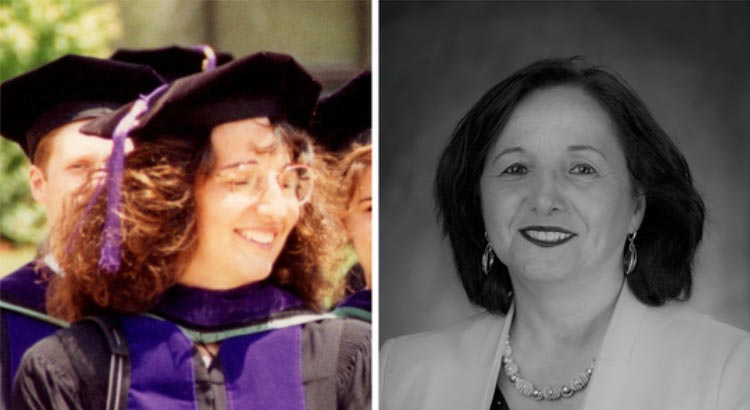Buta Biberaj (JD ’93) Becomes First Elected Female Loudoun County Commonwealth’s Attorney

My law school class in the late 1950s numbered over 400; the class included one Black student, and fewer than ten women. At a welcoming party of the women, the Dean asked each of us, as an ice breaker, to explain why we had enrolled in the Law School, where we were occupying places that, traditionally, would have been filled by men. (It was one of those moments in life when one wished she could vanish through a trap door. But it was also an alert that there would be no hearty welcome waiting for women at the bar.)
It was a day Buta Biberaj describes as “amazing weather wise,” when she sat before a crowd that included her family, listening to then-Judge Ginsburg and anticipating her own graduation from George Mason Law.
Biberaj recalls that there was “a high percentage, relatively speaking” of women in her graduating class of 1993 and she didn’t fully appreciate the challenges that women in the law faced. “I really wasn’t prepared for that,” Biberaj says.
Immediately after law school, Biberaj and two law school classmates founded a boutique general practice firm and “just about doubled the female attorney ratio in Leesburg, Virginia.”
In her early years practicing as a litigator, Biberaj says she encountered what she now would call microaggressions. For example, she was walking with a male attorney after a networking event in Leesburg and he asked where her office was. She pointed to the building and noted that her firm had office space in the penthouse. “You mean the henhouse?” he replied.
Biberaj says she and her partners “did get underestimated” and judges and adversaries often changed their tones to “kind and gentle” when speaking to them. “You do know I got a law degree,” she remembers thinking about these encounters.
In January 2020, Biberaj became Loudoun County’s first elected Commonwealth’s Attorney, the county’s head prosecutor. Biberaj’s goal in the new position is “doing something smartly rather than just doing things the old way.” She says she approaches the issues before her from a “varied lens” that considers the best way to invest limited community resources. “What brought you here and how do we break that cycle?” she often asks about a case.
For example, in February, a District Court judge approached Biberaj about seven grand larceny charges on a single docket that were nolle pros, meaning the prosecutor was not pursuing them. Biberaj noted that all of the charges involved a homeless veteran with mental health issues. He had stolen from a grocery store and the current charges were based on an automatic penalty due to a prior conviction. “Do you know that he was stealing lunch?” Biberaj asked the judge.
Instead of pursuing a conviction, Biberaj had met with his attorney to see how they could get Veteran’s Affairs services for the individual and “at least food on his daggone table.” Her office is now exploring the possibility of a veterans’ docket.
Biberaj says the best approach is “not always just a conviction” and compares the $66 thousand a year to hold someone in jail with the cost of a community-based approach that considers the victim’s rights and law enforcement interests along with the perpetrator’s situation.
“It’s a crime and it’s against the community but if the harm we’re impacting upon him is greater to him and the community, then we really haven’t done justice,” she says. Biberaj credits George Mason Law with developing her cost-benefit approach. As a law student and young attorney, she remembers questioning the law and economics approach of the school. “Is this what the law is about? You just reduce everything to dollars,” she remembers thinking. “That just makes no sense. Where’s the human factor?”
“Now, fast forward, and all that stuff we learned about law and economics really is the life lesson,” she says. “Everything has a cost.” She sees her responsibility as best using the limited resources available.
“The approach that George Mason had about educating us on law and economics, I don’t know of any other law schools who were doing that,” she notes. “And I think that was the right approach and I think they were way ahead of their time.”
Just like Justice Ginsburg.